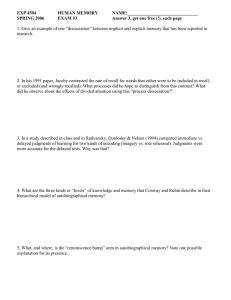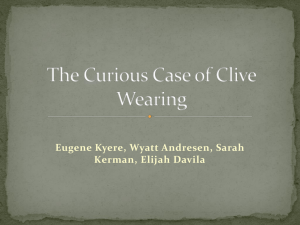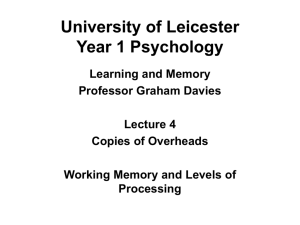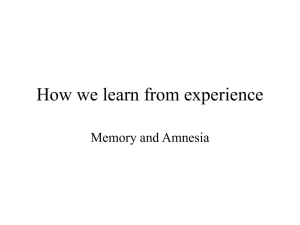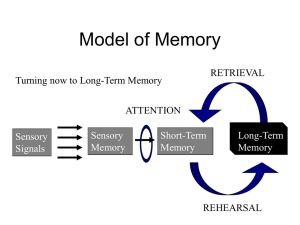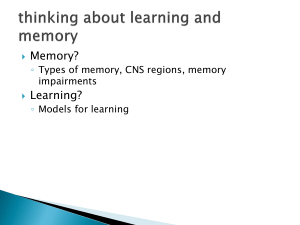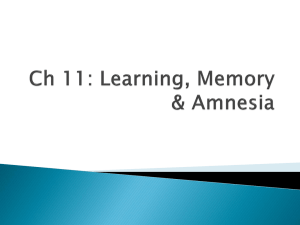Amnesia • Loss of memory ability - usually due to
advertisement
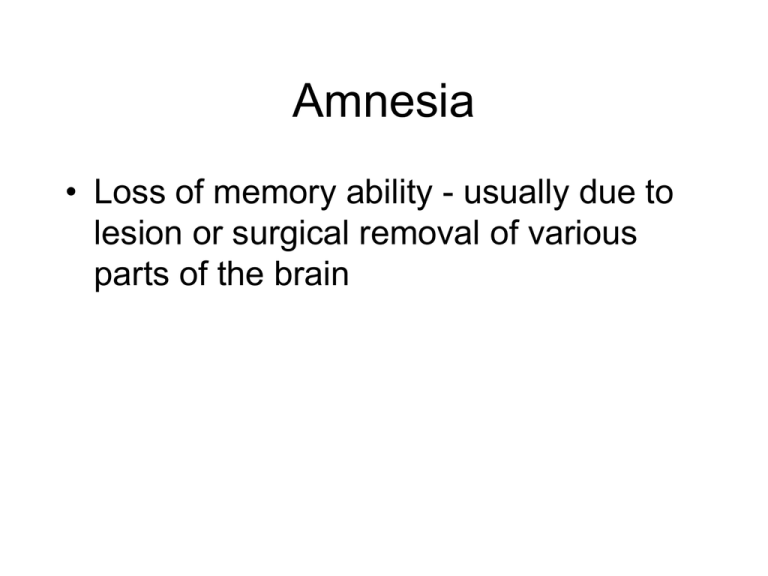
Amnesia • Loss of memory ability - usually due to lesion or surgical removal of various parts of the brain Causes of Amnesia • • • • • • • • • • • • Concussion Migraines Hypoglycemia Epilepsy Electroconvulsive shock therapy Specific brain lesions (i.e. surgical removal) Ischemic events Drugs (esp. anesthetics) Infection Psychological Nutritional deficiency Lack of Sleep! Amnesia • Loss of memory ability - usually due to lesion or surgical removal of various parts of the brain • Two broad categories: – Retrograde: loss of memories for events prior to damage Amnesia • Loss of memory ability - usually due to lesion or surgical removal of various parts of the brain • Two broad categories: – Retrograde: loss of memories for events prior to damage – Anterograde: loss of ability to store new memories of events after damage Amnesia Retrograde Amnesia Anterograde Amnesia Amnesia • Short-term and sensory memory are typically functional Korsakoff’s Syndrome The Lost Mariner - What happened to Jimmie? What was his life like? Korsakoff’s Syndrome (The Lost Mariner) • Lesions to Medial Thalamus – Results from chronic alcoholism and consequent thiamine deficiency Korsakoff’s Syndrome (The Lost Mariner) • Lesions to Medial Thalamus – Results from chronic alcoholism and consequent thiamine deficiency – Severe anterograde amnesia Korsakoff’s Syndrome (The Lost Mariner) • Lesions to Medial Thalamus – Results from chronic alcoholism and consequent thiamine deficiency – Severe anterograde amnesia – Severe retrograde amnesia extending years before damage Korsakoff’s Syndrome (The Lost Mariner) • Lesions to Medial Thalamus – Results from chronic alcoholism and consequent thiamine deficiency – Severe anterograde amnesia – Severe retrograde amnesia extending years before damage – Confabulation - make up stories to explain absence of memory Korsakoff’s Syndrome (The Lost Mariner) • Lesions to Medial Thalamus – Results from chronic alcoholism and consequent thiamine deficiency – Severe anterograde amnesia – Severe retrograde amnesia extending years before damage – Confabulation - make up stories to explain absence of memory – Often unaware of their deficit H. M. • Patient H. M. suffered from extreme epilepsy 1926-2008 Henry Gustav Molaison H. M. • Patient H. M. - bilateral resection of medial temporal lobes (containing hippocampus) – William Beecher Scoville and Brenda Milner - late 1950’s H. M. • Patient H. M. - bilateral resection of medial temporal lobes (containing hippocampus) – William Beecher Scoville and Brenda Milner - late 1950’s – Severe anterograde amnesia H. M. • Patient H. M. - bilateral resection of medial temporal lobes (containing hippocampus) – William Beecher Scoville and Brenda Milner - late 1950’s – Severe anterograde amnesia – Retrograde amnesia for 1 - 3 years before surgery H. M. H. M. • Some aspects of memory were spared (at least to some extent) H. M. • Some aspects of memory were spared (at least to some extent) – Procedural memory was largely unaffected - amnesia was largely restricted to episodic memory Mirror Writing H. M. • Some aspects of memory were spared (at least to some extent) – Procedural memory was largely unaffected - amnesia was largely restricted to episodic memory – Some implicit awareness of recent events H. M. • Some aspects of memory were spared (at least to some extent) – Procedural memory was largely unaffected - amnesia was largely restricted to episodic memory – Some implicit awareness of recent events – Normal digit span (short-term memory) ! Everyone experiences memory loss with aging Decline in temporal lobe size with age Everyone experiences memory loss with aging • What can you do? – Minimize stress – Proper nutrition (eat your veggies) – Healthy lifestyle (exercise and sleep) – Keep using your brain – Protect your brain from injury Hypermnesia - S. • “Photographic” extreme memory ability (a mnemonist) Hypermnesia - S. • “Photographic” extreme memory ability (a mnemonist) • Able to recall complex test stimuli Hypermnesia - S. • S. used two “strategies” or abilities typical of mnemonists: – Rich synesthesia-like quality to his perception of stimuli - leads to stronger associative links Hypermnesia - S. • S. used two “strategies” or abilities typical of mnemonists: – Rich synesthesia-like quality to his perception of stimuli - leads to stronger associative links – Vivid and elaborate mental imagery of things he should remember Hypermnesia - S. • “ Even numbers remind me of images. Take the number 1. This is a proud, well-built man; 2 is a high-spirited woman; 3 a gloomy person (shy, I don’t Know); 6 a man with a swollen foot...” Luria, A.R. The mind of a mnemonist. 1968 Luria, A.R. The man with a shattered world. 1972 Long-term Memory • What do you think the brain of someone that has this “super memory” would look like? Long-term Memory • What if I told you it looked like this? Kim Peek Long-term Memory • Kim Peek was the inspiration for the character Raymond Babbit in Rain Man • The real Kim Peek probably wasn’t autistic but he did have severe developemental and social deficits Long-term Memory • The moral of the story of Kim Peek is that there is still much to learn regarding the psychology and neuroscience of long-term memory Next Time Awareness and Your Brain
